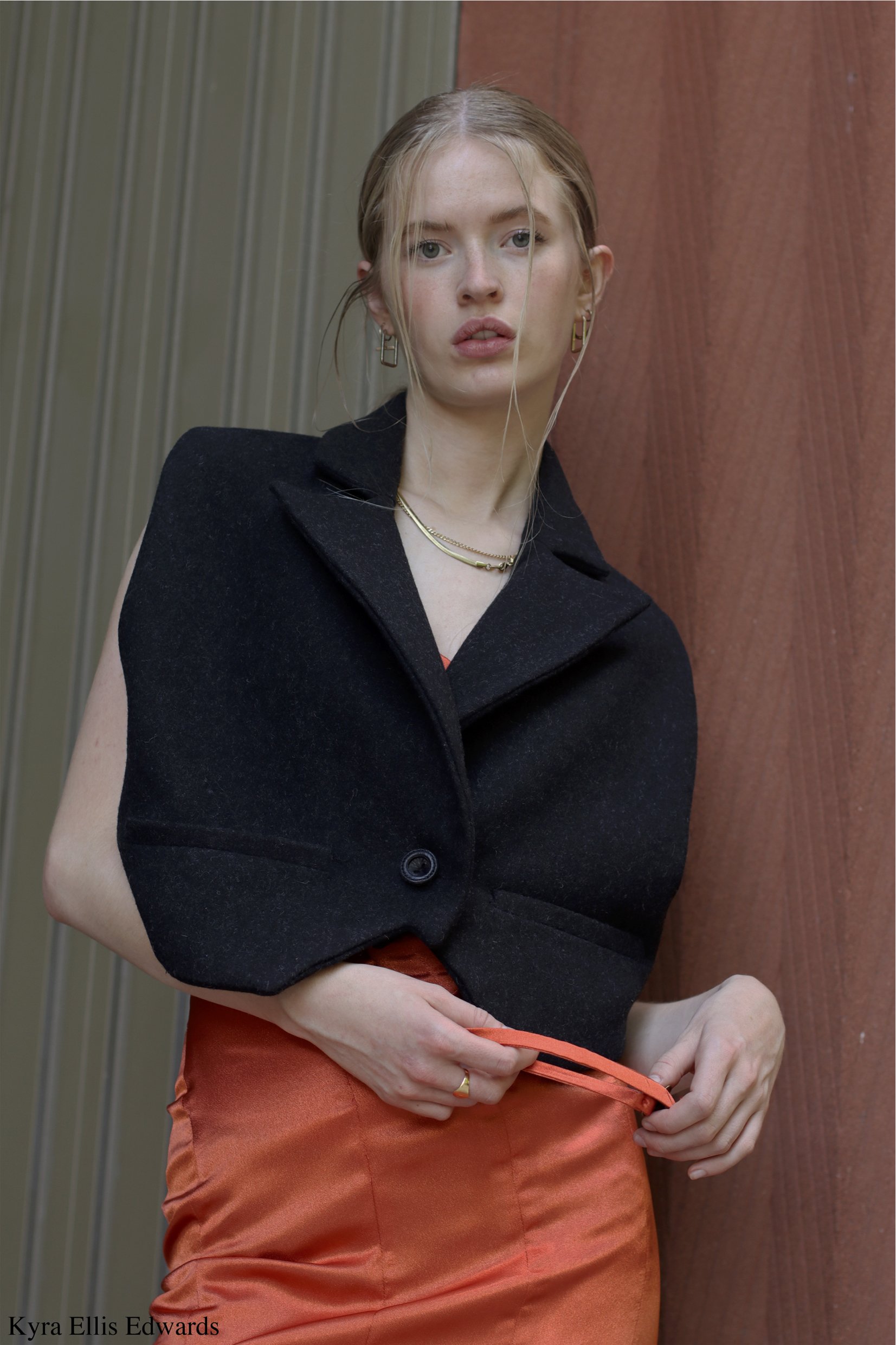Kyra Simone Ellis-Edwards, Fashion Illustration Award Winner. She studied Fashion BA Hons at Kingston University.
How do you feel about winning a GFW22 award?
I was so honored to be nominated for this award by my university, as illustration is a craft I have loved from very young age which sparked my passion for design. So to have won the award for Fashion Illustration was extremely special to me, having the opportunity to present my work at Graduate Fashion Week was a surreal experience I will always hold dear!
What was the inspiration starting point for your award-winning FMP?
I’ve always loved the idea creating an identity with my illustrations which enables me to narrate my design process in a very personal way. My starting point is always to create movement in my drawings to mirror how see texture and pattern in fabrication. As my FMP explored ideas surrounding gender identities within a contextual standpoint in the 1800s in Paris, I took a lot of inspiration from the prominent art forms during that time such as musical theater to capture the vibrancy and fluidity of clothing.
I was especially influenced by my dad’s favourite film/play Moulin Rouge which became a playful detail in my collection to deconstruct the conventional ideals society attaches to women’s dress by creating structured silhouettes kindred with masculinity. As a womenswear designer, the initial starting point was researching primary and secondary imagery of different time periods that had always influenced me in design and illustrating women in a modern and liberating way.
What skills did you learn and develop during the production of your FMP?
I felt working on my FMP gave me the opportunity to advance the previous skills I had learned while studying design. I enjoyed learning about various pattern-cutting techniques to create inventive silhouettes. I also loved working with unfamiliar fabrications when constructing my final garments by developing the skill of relying on my 2D work through illustration and colour experimentation to create beautifully finished garments. As my final collection is inspired by the refined craftsmanship of tailoring, my toiling process is a skill I would say I developed the most, I became very familiar with the industrial sewing machine and found a new appreciation for the patience it takes for garments to be made.
What were some challenges that you faced in producing your FMP and how did you overcome these?
I feel I’ve had to allow the design process to take a shape of its own, and learn the importance of changing my initial way of thinking in order to create a visually authentic collection. The subjectivity of fashion compelled me to explore different ways of approaching my FMP.I found this realisation somewhat challenging as I had to grow with my collection as opposed to controlling the direction it took. Having completed my degree in fashion design I can now say my personal understanding of design has challenged me in all the best ways. I have learnt to be patient yet ambitious.
Are there any messages or major themes in your FMP that you want people to take away? If so, how did you choose to communicate them?
My concept for my final collection communicates the celebration of the precision and patience of traditional craftsmanship. Creating well-made garments not only increases the longevity of the clothes we love but moves the fashion industry into a more sustainable way of thinking. I’ve always felt I can express my thoughts and opinions in a visual way using fashion as a creative language. My FMP has taken many forms and highlighted important conversations within the fashion industry and to myself personally. The recurrent themes which directed my design process were exploring the significance of the fashion industry’s representation of gender roles, an insight into the culture of contemporary fashion's reliance on traditional tailoring and how society propagates their identity allied with their culture through fashion. By communicating the themes explored in a culturally diverse way through my illustrations I hoped to create an inclusive form of fashion.
What is an aspect of the fashion industry that you want to help improve or have a positive impact on?
I am so passionate about using visual art forms to communicate important conversations in the fashion industry in a creative way! I can only hope to be an additional voice in design to continue to explore and promote a positive, sustainable and inclusive mindset within the design. I simply love to create, especially through my illustrations to signify the importance of representing all individual identities, which allows the creative industry to thrive.
What form does your FMP take? Is it a collection of clothing, book, presentation, etc? If relevant, how did you source the materials for the project?
My FMP ‘Monsieur en Lingerie’ is a line-up of 6 looks/outfits, designed and constructed by myself. I learnt about the intricacy of men’s tailoring by playing with structured shapes on a woman’s silhouette. Although my initial focus was my admiration for tailoring as an art form, my collection embodied a more androgynist aesthetic which I found particularly enlightening. The materials used in the creation of my final collection were sourced in the UK, I was also fortunate enough to use off-cut fabrics supplied by my university donated by designer brands such as Burberry to create a few of my garments. As well as up-cycling fastenings from pre-owned garments to repurpose buttons and zips in my collection.
What are your plans for the near future (further study/ internship/ work?) now that you've finished your BA?
As I have now finished my degree in Fashion, I can’t wait to work within the design industry. I’m excited to continue to create and most importantly continue to learn. I would love to have the opportunity to secure a design role within a company who have had a positive impact in fashion. I aspire to challenge myself, advance my design skills and keep drawing to narrate my ideas.














